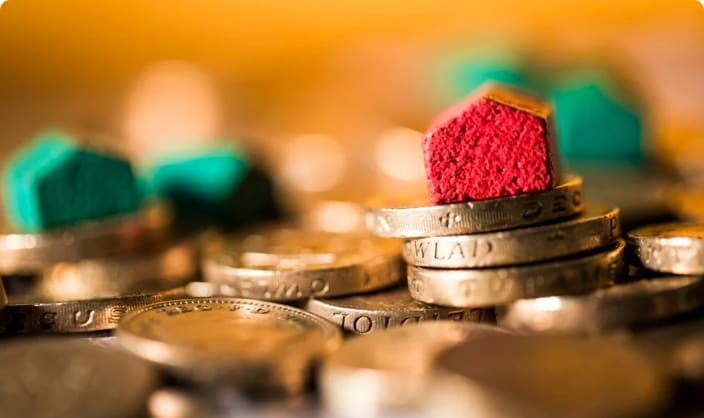Secured Loans for debt consolidation
Debt consolidation is a solution to simplify your finances when multiple debts become overwhelming. One effective approach is using secured loans for debt consolidation. Our expert advisors are available to guide you through the process.

Understanding debt consolidation
Understanding debt consolidation is essential for those who are looking for financial stability. It involves merging multiple debts, such as credit card balances or personal loans into a single, manageable monthly repayment.
The goal is to simplify your financial situation and reduce the burden of your unsecured debts.

Other useful resources
Looking to move house, remortgage or buy your first home? We can help you find a mortgage to suit your needs, wherever you may live in the UK.

Calculators
These calculators are great for getting a quick guide, but if you want a completely accurate assessment then you should talk to one of our professional advisors.

Contact Us
Feel free to call us at any time to speak to a friendly, professional adviser. Or alternatively, visit a nearby branch to talk to an expert.
- Birmingham
- Bournemouth
- Braintree
- Brighton
- Bristol
- Bury St. Edmunds
- Cambridge
- Colchester
- Diss
- Felixstowe
- Gloucester
- Great Yarmouth
- Haverhill
- Ipswich
- King's Lynn
- Leeds
- Leicester
- Leiston
- Liverpool
- London
- Lowestoft
- Luton
- Manchester
- Milton Keynes
- Needham Market
- Newcastle
- Northampton
- Norwich
- Nottingham
- Oxford
- Peterborough
- Portsmouth
- Reading
- Sheffield
- Slough
- Solihull
- Southampton
- Stowmarket
- Sudbury
- Thetford
- Watford
- Woodbridge
How to get a debt consolidation loan
Getting a secured loan to clear debt involves several steps to ensure you secure the best terms and options:
Step 1
Assess your finances including:
-
- Total debt.
- Income.
- Assets that can be used as collateral.
Step 2
Check your credit reports and scores as this can affect the terms and interest rates offered.
Step 3
Create a detailed budget to understand your monthly income, expenses and debt obligations. This will help you to understand how much you can afford to repay monthly.
Step 4
Choose your collateral wisely and make sure you have ownership of the asset. Ensure that the asset can be used as security for a loan.
Step 5
Consult The Mortgage Centres, we can help you to find the best lender and terms based on your specific financial situation.
Step 6
Get the necessary documents like proof of income, collateral details, and info about your debts.
Step 7
We will help you to submit your loan application to your selected lender. They will assess your application, credit history, and collateral.
Step 8
If you use property as collateral, the lender may get an appraisal to find out how much it’s worth.
Step 9
Once the lender reviews your application and collateral, they will make an offer. Carefully review the terms and, if acceptable, proceed with the loan.
Obtaining a secured loan for debt consolidation is a significant financial decision. Talking to experts and doing research is important to make informed choices and get the best terms for your situation.
Is debt consolidation a good idea?
A secured loan to consolidate debt can be beneficial for some people, but it comes with risks. Consider these factors when deciding if using a secured loan for debt consolidation is right for you:
- Secured loans usually have lower interest rates as collateral, making them cost-effective. Unsecured loans often come with higher interest rates.
- A secured loan is often easier to gain approval for, even with poor credit. Using assets as collateral minimises risks for lenders.
- Secured loans offer access to larger amounts for consolidating substantial debts.
- A secured loan offers longer repayment periods than an unsecured loan, resulting in more manageable monthly payments.
- Timely payments positively impact your credit score, demonstrating responsible financial management.
- The primary downside to a secured loan is the risk of losing collateral, such as your home or car, if payments falter.
- Although interest rates are lower, extended repayment terms may lead to higher long-term interest expenses.
- Evaluating collateral can make getting a loan take longer, so a secured loan isn’t a fast solution.
- Without valuable collateral to offer, secured loans may not be an option for you.
- Collateral ties restrict your asset from being sold until the loan is repaid.
What collateral can be used for a secured loan?
Collateral for a secured loan typically includes a range of assets that you can use to secure the loan. This gives the lender a form of security in case you cannot repay. Common forms of collateral for secured loans in the UK include:
This is one of the most common forms of collateral for secured loans. You can use your home as collateral, whether you own it outright or still have a mortgage.
If you own investment properties, you can use them as collateral for secured loans.
Cars, motorcycles, and other vehicles with significant value can serve as collateral.
You can use savings accounts, stocks, bonds, or investment portfolios as collateral.
High-value jewellery, art, or collectibles can be used to secure a loan.
In the case of business loans, equipment, machinery, or business assets can be used as collateral.
Besides your primary residence, you may use other real estate properties, such as commercial properties or land, as collateral.
It’s essential to note that the specific collateral accepted can vary from one lender to another. The value and equity in the collateral will play a significant role in determining the loan amount and terms. If you default on the loan, the lender has the legal right to take possession of the collateral to recover their losses. Carefully consider the collateral and ensure that you can meet the loan’s repayment terms to avoid losing your assets.
What’s the difference between secured and unsecured loans:
- Collateral: Secured loans require collateral, like a home or a car, while unsecured loans rely on creditworthiness.
- Risk: Secured loans offer lower interest rates but risk collateral loss; unsecured loans have higher rates but no collateral.
- Loan amount: Secured loans provide access to larger amounts due to collateral.
- Approval criteria: Secured loans are easier to qualify for, as collateral secures the lender.
- Repayment terms: Secured loans offer longer terms for lower monthly payments.
Frequently Asked Questions
Debt consolidation can indeed impact your ability to buy a home in several ways, both positively and negatively. If handled well, consolidating debt can boost your credit score, an important factor for lenders when approving mortgage applications. A good credit score helps you get better mortgage rates and terms when borrowing money.
However, it’s essential to handle debt consolidation prudently. Using your home as collateral or taking on more debt after consolidating can endanger your property. In the worst-case scenario, lenders may exercise their right to repossess your home if you default on the loan. Additionally, closing old credit accounts post-consolidation may shorten your credit history, potentially affecting your credit score.
Debt consolidation can help you buy a home by improving your finances, but it also has risks. You need to think carefully and manage your money responsibly to make sure you can still own a home.
Yes, it is possible to get a secured debt consolidation loan with bad credit. It’s easier to get secured loans for debt consolidation, even if you have bad credit, compared to unsecured loans. Secured loans need collateral like your home or valuable assets, which lowers the risk for the lender.
Secured loans can be affected by your credit history, which can impact the loan’s interest rates and terms. With bad credit, you may be offered the loan with less favourable terms, such as a higher interest rate.
To increase your chances of getting a secured debt consolidation loan, talk to financial advisors who work with specialised lenders. Our advisors can assist you in finding better options for people with poor credit and help you through the process.
We'll call you...
"*" indicates required fields


